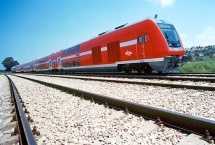Companies from Russia, China, Kazakhstan, Belarus and Georgia have so far responded to Transportation Ministry's request to submit proposals for project's planning
Following the publication last month by the Transportation Ministry of Request For Information (RFI) to stimulate the private sector’s interest in building a railroad to Eilat, there seem to be a worldwide interest in the offer.
Companies from Russia, China, Kazakhstan, Belarus and Georgia have so far responded to Transportation Ministry's request to submit proposals for project's planning, construction and operation.
The project will include a 170-kilometer (105-mile) double railroad from Zin to Eilat. The entire railway, from Tel Aviv to Eilat, will be 350 kilometers (217 miles) long, and the duration of the journey will not exceed two and a half hours. In addition to a high-speed Tel Aviv-Beersheba-Eilat train, a local train will connect eight stations near the communities of the Arava region.
According to the Transportation Ministry, the new railway will include 63 bridges and five tunnels. The track will connect to the existing line that leads from Beersheba to Dimona and include eight new stations along the way, including a station at the as-yet-unbuilt airport in Timna.
Travel time from Tel Aviv to Eilat is expected to take two-and-a-half hours by rail, and it is estimated that the line will cater to 3.5 million passengers per year.
According to the ministry, the track will also carry freight containers from the port of Eilat to the rest of the country and assist in reducing truck transport across the country, freeing up the roads, reducing pollution and reducing accidents.
The railroad to Eilat is part of the government’s transportation reform plan, in which NIS 2.5 billion has been earmarked for planning new roads and railways.






